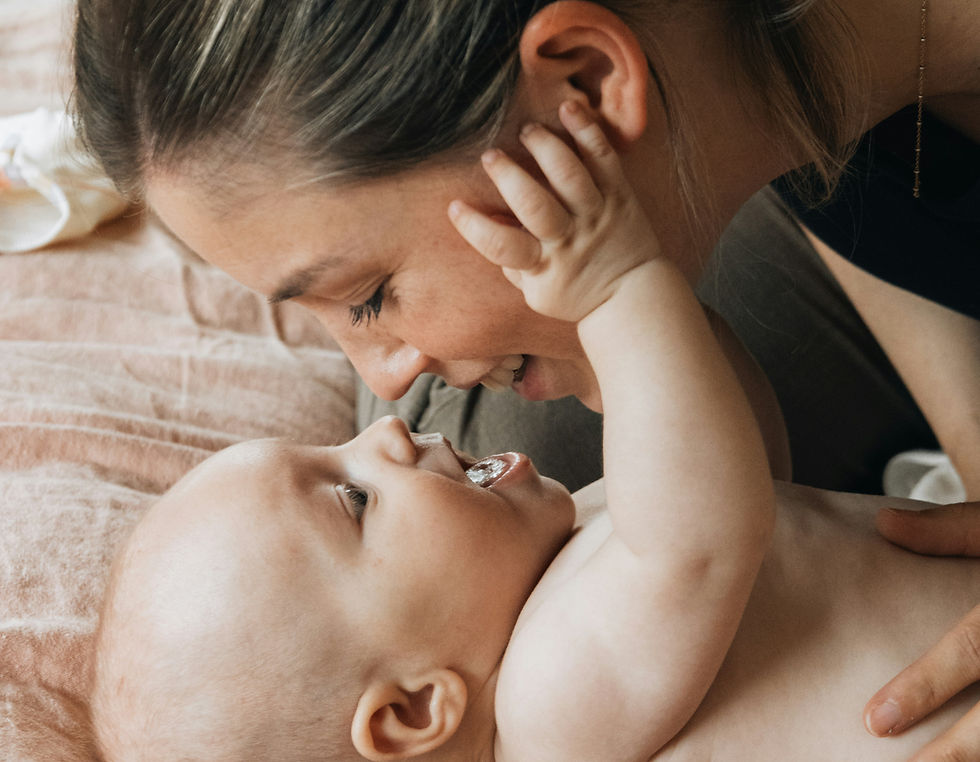Why Postnatal Depression is More Than Just "Baby Blues"
- Emmanuel Daniel
- Oct 8, 2025
- 4 min read

You've just brought your beautiful baby home, and everyone expects you to be glowing with joy. Instead, you feel empty, overwhelmed, or strangely disconnected. Well-meaning friends tell you it's "just the baby blues" and it'll pass, but deep down you know something feels different. Understanding the difference between baby blues and depression isn't just about labels — it's about getting the right support at the right time.
Postnatal depression affects approximately 1 in 7 new mothers, yet it remains widely misunderstood and often dismissed as a normal part of new motherhood. The truth is, while some emotional turbulence after birth is common, clinical postnatal depression is a serious condition that requires professional support and intervention.
Baby Blues vs Postnatal Depression: Understanding the Difference
The baby blues are extremely common, affecting up to 80% of new mothers in the first two weeks after birth. These temporary mood swings are linked to hormonal changes, sleep deprivation, and the overwhelming adjustment to life with a newborn. You might feel tearful, anxious, or irritable, but you can still function and these feelings typically resolve on their own within two weeks.
Postnatal depression is fundamentally different. The symptoms of postnatal depression are more severe, last longer, and significantly interfere with your ability to care for yourself and your baby. Rather than improving after a couple of weeks, they persist or worsen, often beginning within the first few months after birth but sometimes emerging up to a year postpartum.
The key distinction lies in intensity, duration, and impact on daily functioning. Baby blues feel like an emotional rollercoaster you're riding; postnatal depression feels like you're drowning.
Recognizing the Signs of Postnatal Depression
Maternal mental health challenges can manifest in various ways, and not every mother experiences the same symptoms. However, certain signs of postnatal depression should prompt you to seek help.
Persistent sadness or emptiness that doesn't lift, even during positive moments. You might feel numb rather than sad, as if you're moving through life on autopilot without really feeling anything.
Overwhelming anxiety or panic attacks that go beyond normal new-parent worries. You might experience intrusive thoughts about something terrible happening to your baby, or feel paralyzed by fear that you can't keep them safe.
Guilt and withdrawal after childbirth are particularly common. You might feel intense guilt about not bonding instantly with your baby or not being the "perfect mother" you imagined you'd be. This shame can lead to withdrawing from friends and family precisely when you need support most.
Disconnection from baby is one of the most distressing symptoms. You might feel emotionally detached from your infant, going through the motions of care without feeling the love you "should" feel. This doesn't make you a bad mother — it makes you someone experiencing a mental health condition that affects your emotional capacity.
Physical symptoms often accompany emotional ones: severe fatigue beyond normal newborn exhaustion, changes in appetite (either significant decrease or increase), difficulty sleeping even when the baby sleeps, or physical aches and pains without clear cause.
Thoughts of harming yourself or your baby are serious warning signs requiring immediate professional help. These thoughts don't mean you're dangerous — they're symptoms of severe depression that need urgent treatment.
Why Early Support for New Mothers Matters
Recognizing these symptoms early and seeking postnatal depression support can dramatically improve outcomes for both mother and baby. The earlier you receive help, the better your recovery and the less impact on your family relationships.
Maternal mental health affects infant development. Babies thrive on responsive, attuned care, and untreated depression can interfere with bonding and attachment. Early intervention protects not just your wellbeing but also your baby's emotional and cognitive development.
Depression doesn't improve through willpower alone. Postnatal depression involves real changes in brain chemistry and stress hormones. Telling yourself to "snap out of it" or feeling guilty about your feelings only adds to your burden. Professional postpartum mental health treatment addresses the underlying biological and psychological factors maintaining depression.
Your partner and family need support too. Postnatal depression affects the entire family system. Partners may feel helpless, confused, or overwhelmed themselves. Postnatal counselling can provide strategies for the whole family to navigate this challenging period together.
Breaking the Silence Around New Mother Mental Health
The stigma surrounding maternal mental health often prevents mothers from seeking help. You might worry about being judged as ungrateful, incapable, or a bad mother. The truth is that postnatal depression is not a reflection of your character, your love for your baby, or your capability as a parent — it's a medical condition that happens to good mothers.
Help for postnatal depression is available and effective. Evidence-based treatments including therapy, support groups, and sometimes medication can help you recover. Many mothers find that talking with a trained psychologist who specializes in postpartum mental health treatment provides relief, validation, and practical strategies for managing symptoms while caring for a newborn.
Postpartum depression awareness is growing, but many mothers still suffer in silence because they don't recognize their symptoms as clinical depression or don't know where to turn for help. If you recognize yourself in these descriptions, please know that you're not alone and recovery is absolutely possible.
You Deserve Support and Recovery
Motherhood brings profound changes, and struggling during this transition doesn't make you weak or ungrateful. Postnatal depression is a treatable condition, and seeking help is one of the most loving things you can do for yourself and your baby.
Experiencing symptoms of postnatal depression? You don't have to struggle alone. Our psychologists specialize in maternal mental health and understand the unique challenges of new motherhood. Book a session with one of our psychologists today and take the first step toward feeling like yourself again.




Comments